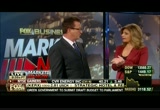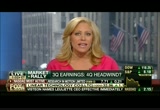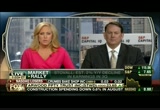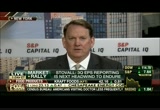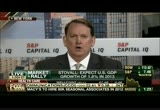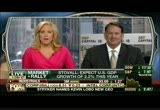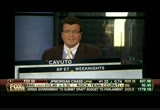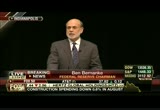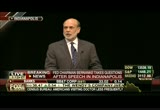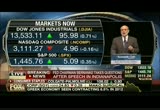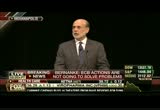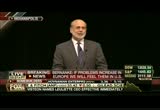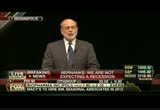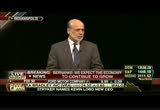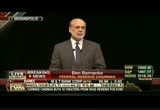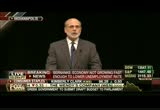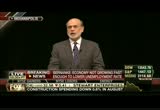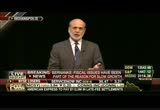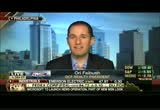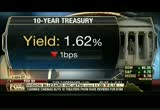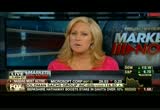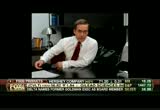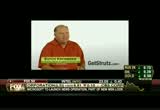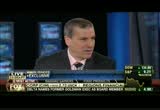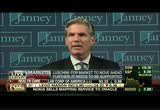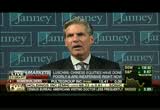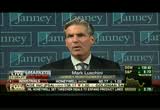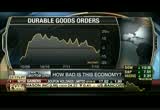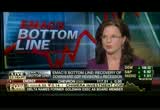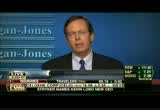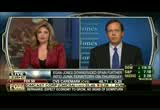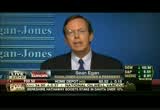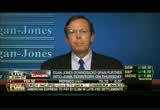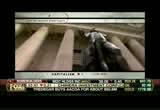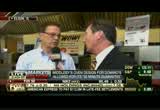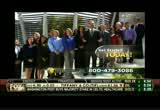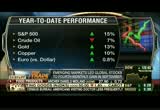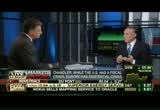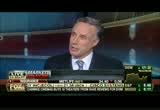tv Markets Now FOX Business October 1, 2012 1:00pm-3:00pm EDT
1:00 pm
this could go up even more. tracy: we need to seek conviction. get some volume back into this market. melissa francis, we will throw it to you. melissa: all right. i will take it away. i am melissa francis. stocks surging. the dow having its best day since mid- september. s&p capital -- is here. gold hitting fresh 2012 highs after posting its biggest quarterly gain in more than 20 years. when doing good is being bad, one philadelphia man and his fight to save the neighborhood gets tripped up by a whole of red tape. we will introduce you to him and hear his unbelievable story. that is a before and after picture. he made it better.
1:01 pm
you have to stay tuned for that. time for stocks now as we do every 15 minutes. nicole petallides is standing by. nicole: i look forward to that story. the before and after pictures are quite telling. we are doing quite well today. up 124-point right now. off of our earlier highs. you have most of the names on the dow with up aeros. microsoft and cisco being the only two pulling back a little bit. microsoft getting some downgrades today. you have financials, jpmorgan, bank of america leading the dow. others for banks, drugs, oil services, good day on wall street. we do not have contraction anymore, we actually have some
1:02 pm
expansion. let's take a look at the ceramics industry. 3m is buying. this is that a 43% premium. we have seen it up about 43% 43%. really hitting the nail with that. back to you. melissa: thank you. federal reserve chairman for nikki is speaking in indianapolis today. we are awaiting the question and answer session. as soon as it starts, we will bring it to you live. everyone knows what is in there. it is the q and a that everyone wants. third-quarter earnings season is here. the lackluster results, will
1:03 pm
they be a headwind? sam stovall is here now. the market is absolutely on fire today. up another 118 points. you think we could go up another seven-12% from today's levels? >> i think that is a possibility. we look at history. we overlay that with economics, fundamentals and the technical picture to see whether history is likely to rhyme or forget the words. right now our feeling is we could see the market moving up between 1535 and even 1600 before the beginning of 2013. melissa: the stock market continues to define logic. there was more talk about being in the midst of another recession. stocks continued to move higher. i know a lot of it is because qt
1:04 pm
one, two and three, do you think that is enough to hold it? >> we find prices tend to lead fundamentals. not that we are heading towards recession and we just do not know it yet, maybe we are heading towards recovery and we just do not know it yet. that is why people will be focusing so closely on the third-quarter reporting season. the bar is underground. we are expecting a mere 2% the client. the question is, will we be getting that near 10% growth in q4 and a seven-13% gain for all of 2013? that is the real question. melissa: what would trip you up and make you less bullish? >> i think if we did not get that manufacturing report that came out today and we saw the u.s. was looking more deeply or getting closer to recession, so, certainly, i am not a pollyanna,
1:05 pm
i will be laying this situation very closely. if we end up seeing more data that is we are heading towards recession or companies say they are slashing their guidance, that would be a concern. melissa: i want to bring it to the individual investor at home. volume and trading in things like e*trade plunged 37% in august. the individual investor is really getting out. we arty thought they were out, they are getting out even more and they are leaving their trading to the professionals, the algorithmic traders. is it a mistake? what would you say about that? >> my first thought would be it is august. a summertime month. is it sequential% change or year over year. at the same time, when you look at any sentiment indicator whether it is the american association of individual investors or others, many
1:06 pm
individual investors are continuing to move away from equities towards fixed income. if they are willing to dip their toes at all it is hybrid. sometimes that can be a very contrary indicator whenever one moves to one side of the boat. they be it is time to move to the other. melissa: stocks have moved much higher. do you think the individual investor has missed out? >> well, i think they have missed out, but i do not think it is too late to get in. one of the things i looked at was the rule of 20. you look at the price to earnings ratio, you add to it the rate of inflation, if it equals 20, we are at a fairly valued market. it is showing we could still rise by another 10% just to get to a fair value situation and that is before we get an improvement in macroeconomic numbers that could happen as we head into 2013. melissa: sam so -- sam stovall,
1:07 pm
tank you very much. 2000 people bought tickets and paid to listen to bernanke. we will bring it all to you. no ticket needed. take a look at metals as we go to break. we will be right back. ♪ want to try to crack it? yeah, that's the way to do it! now we need a little bit more... a little bit more vanilla? this is great! [ male announcer ] at humana, we believe there's never been a better time to share your passions... because the results... are you having fun doing this? yeah.
1:08 pm
that's a very nice cake! [ male announcer ] well, you can't beat them. [ giggles ] ohh! you got something huh? whoa... [ male announcer ] humana understands the value of spending time together that's a lot of work getting that one in! let's go see the birdies. [ male announcer ] one on one, sharing what you know. let's do it grandpa. that's why humana agen will sit down with you, to listen and understand what's important to you. it's how we help you choose the right humana medicare plan for you. because when your medicare is taken care of, you can spend more time sharing your passions. wow. [ giggles ] [ male announcer ] with the people who matter most. i love you grandpa! i love you grandma! now you're a real fishman. [ male announcer ] humana.
1:11 pm
melissa: breaking news on the floor of the new york stock exchange. let's go straight to nicole petallides. nicole: if you look at and intraday chart, you will see a huge jump here. a tech company in the s&p 500 jumping on the idea they are exploring a sale. they are looking at potential buyers including some private sources as well. we will continue to follow this. back to you. melissa: or breaking news right now. bernanke starting to take questions after his speech. let's listen in. >> japan, of course, is the first modern economy to be trapped at the zero bound. interest rates close to zero.
1:12 pm
their experience foreshadowed the global financial crisis of 2008. the japanese had a stock market booming bust and a property boom and bust together which was roughly double the size, proportionally speaking, to the united states. it was a major shock to the economy. they have responded to it to a variety of tools. i think a couple things that we learned from watching their experience and troubles and difficulties they have been through and to that i would point to that we have tried to learn from them, the first is, aggressiveness, early aggressiveness of monetary policy. what we learned from japan is we learned from the 1930s. once you have a deflation, prices dropping, prices and wages are dropping, they can be very very hard to get out of
1:13 pm
that. there is a lot of downward pressure on the economy. we were very aggressive early on in the united states to avoid deflation and we have maintained inflation close to our 2% target which is close to where we think it should be. low enough so it does not create major problems for businesses, markets and so enough and high enough to stay away from the deflation boundary. the other thing is getting to your banking system and recapitalizing and getting it back into operation as soon as possible. japanese took a wild to do that. for a period of time their banks were not extending credit. that lasted for a number of years. financial crises are difficult for everyone. we try to address the problem with pain capital very early. in 2009 when the economy was still deep in recession,
1:14 pm
financial crisis was still going on, the federal reserve led an effort to stress test all of the largest holding bank companies in the united states and determine how much capital they needed, not only to be stable, but to lead and support economic recovery. whatever capital they did not have, they had to go out and get. this restored a great deal of confidence in our banking system. over the subsequent months, the u.s. banks went out and raised several hundred against of dollars in new private capital and at that time, well, of course, there is still difficulties and credit markets and lending standards are still tight in some areas, lending has shown recovery, a significant amount of recovery and banks are back operating and providing credit to the economy. those are some of the things that we learned. but, again, i don't want to in
1:15 pm
any way argued that the japanese are facing anything other than an extraordinary situation. they were headed, initially, but a shocked twice the size of what we experienced. >> mr. chairman, this is a city where the ideas of milton friedman continued to get a lot of attention. one of our questions via twitter is how you think he may have viewed the federal reserve evolving role over the last five years. >> i think -- i am a very big fan of belden friedman. i was a colleague of his. i had many opportunities to speak with him. i spoke at his 90th birthday party. he was a terrific economist. very insightful. i think he would support what we are doing. one of the things that made his reputation was his work with anna schwartz about the great
1:16 pm
depression. they pointed to two basic problems. they pointed to the deflation, the overly tight monetary policy and they pointed to the collapse of the banking system. we took that very much to heart. we were aggressive early on. we did not allow the fact that interest rates were very low to pull us that monetary policy was just accommodated as it needed to be and we were aggressive, as you know, and trying to prevent the clots of our banking system. in addition, he very much supported providing enough liquidity to the economy so that the economy could grow and that inflation could be at a low and
1:17 pm
stable level and, in fact, about a dozen years ago, i think it was in the year 2000, friedman was asked what the japanese should do at that time and he said they should go out and buy securities which is exactly what the federal reserve is doing right now. making sure there is enough liquidity in the system. there are many other factors that are holding back on our economy. we want to make sure monetary policy has enough adequate support. i think professor friedman would've been very comfortable with that. >> can you talk a little bit about what is happening in europe right now with respect to the european central bank and the central bank in various european countries have been taking action. how does that affect us here? >> we are watching the european situation very carefully. it has been a problem for the u.s. economy. we have seen headwinds coming from slowing trade, slowing
1:18 pm
economic activity in europe, and the financial stresses tied to europe. that has affected our markets and economy. we have a very strong interest in europe solving its problems. in addition, they have so far avoided any real blowups in the financial system. if that were to happen, that would not be confined to europe. it would be felt around the world and certainly the united states. we have a lot of interest and following that situation. it is a very difficult, complex situation. instead of having a single government, trying to decide how to solve these problems, they have 17 countries in the euro zone, each one with its own parliament and politics. the process of making decisions has been very difficult. the problem, a very simple way of looking at the problem is that the 17 countries of the euro zone have single monetary
1:19 pm
policy. the european central bank and euro -- they have 17 different fiscal policies. they are not able to support each other during a period of recession which they are currently in. what is needed is some ongoing structural reforms that will, first of all, improve their cooperation and coordination on fiscal policy and they are trying to do that. the second very useful step would be what they are calling banking union which is making bank supervision, oversight, capitalization, responsibilities of europe as a whole and not of each individual country. in order to get to that point, they have to keep stability in the market and the ecb has done some very constructive things in terms of its financing operations, more recent proposals to try to keep market stable, you know, for at least a period of time.
1:20 pm
the ecb actions as useful as they are will not solve the problems, they will basically just provide time. while they provide time, it is very important that the governments of europe work together to provide the structural changes that are necessary. we are confident that the europeans will rise to this challenge. they have very strong political investment in the e euro area ad the european union has ways of trying to create greater political comedy in europe. there is a lot of incentive for them to get it done. as i said, it will be a difficult task because you are dealing with in the euro zone, 19 sobran nations each with its own parliament.
1:21 pm
they have influence on the broader policy decisions as well. it is a difficult situation. we watch it very carefully. it is not something that is happening over there, if problems increase in europe, we will certainly feel them here in the united states. >> another question we have here is related to something that was said earlier this morning by an analyst suggesting that national bureau of economic research will eventually proclaimed that we are now already in recession. this person cited the drop in good orders and gdp growth and other week indicators. the question really is, the recession, the declaration of recession is always a look back, are there indicators we are moving into a recessionary direction or, in fact, may already be there? >> i was once a member of that national research.
1:22 pm
i know how it happens. it happens over a nice meal in a french restaurant. [laughter] the 2007 turning point, which i am being a little bit like here ella it is a very careful analysis, but nevertheless, it is a precise analysis. it did not happen until like a year after the suppose turning point. it looks back you now a year or more to try to determine whether key variables have lived in that direction. given that caveat that nobody really knows until some time has passed, right now we see an economy that is expanding.
1:23 pm
we see employment still growing. we expect the economy to continue to grow. that is our best forecast as of now. we are not expecting a recession. with an economy that is going 1.5-2%, that is not fast enough to lower the unemployment rate. that is my concern. that is just enough to help provide jobs for new people coming into the labor force. it does not do anything to eat into the backlog of the unemployed. our unemployment rate of 8.1% currently is about the same as it was in january. we have not made much progress this year. our concern is that growth will continue, but at a pace that is insufficient to put people back to work and the longer we go with millions of people out of work and more than 40% of those unemployed have been unemployed for at least six months, the more people we will have and the
1:24 pm
ability to find work will the client and we will be creating a permanent group of people who will not fulfill their full potential and the labor force. i think that is very costly. that is one of the reasons why the fed is taking action to help support the recovery. >> so, sticking with the somewhat lighter vein for a moment. we have a surprising number of questions about baseball because of your known devotion to the field. can't we learn anything about the dramatic success of the nationals that may apply probably to economic policy or monetary policy specifically or vice versa? [laughter] >> i keep these two issues in a different department. [laughter] i have been a baseball fan for a long time. i think we like the numbers, all the statistics and stuff.
1:25 pm
i think the success of the washington team and i want to say here and now that i have been following them since 2005. not just because they are having a good year. been through a lot of pain as they have improved over time. i think, you know, i think what they have done is they have looked to the future. even when they were really bad, they were trying to hire, scouts, you know, sign young players. they try to look toward the future. i think that is what our economy is all about. we need to think about where we will be. make sure our kids are educated so they are able to contribute to a strong economy. we have to make sure we are doing the right investment we need to have a strong economy. a future orientation, not always looking backwards. i think it is an important thing
1:26 pm
for economic oc makers to think about as well. >> so, a lot of questions about the dollar. i guess the best way to some of these questions would be, what are your concerns about the value of the dollar and maybe related to have the various quantitative easing effort at some point, was a drive down the value of the dollar? >> when people talk about the dollar, they often confusing two very different ideas. i think it is important to him and wish them a little bit. the first idea is the buying power of the dollar. how much can the dollar buy in terms of goods and services when you go to the grocery store, you know, when you go to the mall, where ever you are shopping. the measure of the dollar that matters for that definition is inflation. i talked about inflation in my speech. inflation in the united states has been about to present.
1:27 pm
the markets expect inflation to stay around 2% going forward. people are willing to lend money to the u.s. government or 30 years for less than 3%. that does not sound like a situation where the markets are really expecting high inflation in the future. i think inflation, obviously, we pay very close attention to it. price stability is important. our record has been very good. we are looking at it carefully. i am not too concerned about the dollar on that definition. the other definition on the dollar has to do with the foreign exchange. how many euros does not dollar by? there i would argue that in the medium-term our policies are good for that dollar measure as well. first of all, i note the fax.
1:28 pm
since the crisis or before the crisis, the dollar has gone up and down for various reasons. the biggest factor affecting the dollar has been, frankly, fear. when they have been afraid of a financial situation, they pile into the dollar. risk on and risk off. putting aside those swings associated with risk on and risk off, safe haven flows before the crisis now. it really has not changed much in broad terms. moreover, going forward, the fed mandate you recall is price stability and maximum employment the value of the dollar and maximum employment means a strong economy. an economy where people will want to invest. where returns are high. where money will flow in. those will be the things that
1:29 pm
support the dollar in the medium to long-term. i do not see any consistency with our policy. >> we have time for one more question on i want to make sure we got a question in about unemployment. it is a question a lot of people are thinking about. have you been surprised that policies that have been implemented have not had a greater impact on the unemployment rate and what in your mind are the main explanations for why unemployment is at the level it is at? >> at some level the issue is not unemployment itself, the fact that the economy has not grown not past did the unemployment rate has come down more than -- if it is growing at trent or less, you'll not see much progress in unemployment. the real question is not is there something wrong with the labor market, the question is
1:30 pm
why isn't the economy it growing faster? here i think there are a number of headwinds. there are financial issues early on. there were, of course, the credit and financial stability issues that were dragging down the economy. i think europe is now part of the problem. the uncertainty that europe is feeding through for a number of our variables. a second factor is fiscal issues. you may be aware of this. they have been contracting very sharply. they have been cutting spending back. the overall fiscal situation and then when you add to that, uncertainty is about the fiscal
1:31 pm
cliff, etc., etc., etc. it has been part of the reason for slow growth. a third one is housing. we did have a double whammy. a financial crisis and a housing bubble. they were connected obviously. we had a 30% decline in house prices and a big drop in house construction and house sales. for a long time that was a major drag on the economy as well. normally, in a recovery, usc housing as a big part of that recovery. so far we have seen improvement in housing. obviously, we are not think the strength of housing we would normally see at this stage in the business cycle. there are a number of factors you can point to that help explain why the recovery has not been as fast as we had hoped. given that slow growth in output, it is not really so surprising we have not made more
1:32 pm
progress in unemployment. earlier, it is precisely because long-term unemployment is such a costly thing that we need to get the growth rate up and that is what we are trying to do with the federal reserve. >> please join me in thanking federal chairman bernanke. [ applause ] melissa: that was fed chairman bernanke speaking in indianapolis. you heard him talking about the economy. that was the question and answer portion. someone asked him how milton friedman would respond to his policies. they like to say that milton friedman would be rolling in his grave over what is going on right now. he thinks professor friedman would agree with what he is doing right now. also very interestingly, the question of the day, someone asked him if he thinks we are headed into another recession and we just do not know it yet. he sort of brushed off the comment and said, you know, i
1:33 pm
used to be a member of the bureau that decides whether or not we are in a recession. i know how these things and everybody laughed, whether or not you think it is funny where we are in this recession. he sort of brushed off the question and said, you know, doesn't really matter if we're back in a recession or not. where we are isn't good enough and we don't have enough jobs being added to the payrolls much the longer we go on like this the more unemployment becomes permanent. getting through there a joke, i don't know. time for stocks as we do every 15 minutes. let's head to the floor of the new york stock exchange. nicole petallides is standing by. we were up about 126 when he started speaking. we fell to up about 90. now we've come back a little bit. are traders there watching and listening? >> of course they're watching and listening. when our fed head talks everybody is listening. everybody piece of news comes out of his speeches are obviously market moving events. what did we see here today? the market continues to pull back.
1:34 pm
our highest point of the day we were 13,598. call it 13,600. when you come out with these comments, by the way we should also note the nasdaq composite moved into the red. sach managing to hold onto gains but we're off the highs. couple things we're noting as you hit headlines. they expect the economy to continue to grow. i think it was interesting to talk about the fact that the federal open market committee may have been over optimistic forecast of economic growth and they're obviously having to continue to change their plans. other thing worth note something europe. that is one of the reasons too our market is changing direction a little bit here. he talked about the euro crisis, headwind weighing on the u.s. economy and so they continue to face a crisis. what we're verying here, is that during this time, that the dollar come off the lows. euro is weaking off the earlier highs. that too could be now moving our markets here at home. there is a direct
1:35 pm
correlation between the euro, dollar and our markets. that is something i'm watching as well. back to you. melissa: great observations. thank you so much for that. my next guest says he has used $20,000 of his own money to clean up and renovate a vacant lot that is adjacent to his coffee shop in philadelphia. yet the city's redevelopment authority isn't pleased about it. they issued a cease and desist letter warning legal action against him if contractors and materials were not removed from the property immediately. joining me the man behind the renovation and president of ocf reality. thanks so much for joining us. i want to get right tonight thank you for having me. melissa: this is incredible story. i was looking the before-and-after pictures. i think we have those for folks to see. you basically started a coffee shop in somewhat blight the area of fill definitely. you were sitting next to this vacant lot which was overrun by weeds and, is that, i'm trying to look. can't see the picture. this is the before photo. although i saw even worse
1:36 pm
before pictures so i don't know. i went, there we go. that is masterpiece. you went in there to use your own money to clean it up. pretty extensive. did landscaping and put up a fence. now the local committee, i'm losing track of their name, is upset with you and fining you for doing this. is that right? >> sure. so the photo you showed is from 2009. more recently it was far, far worse than. melissa: i thought there was a worst one, yeah. >> we had engaged the city of philadelphia to actually purchase the lot for years and years and years. the last year i just simply gave up worked with the city to try and get a garden agreement for the lot or to get them to clean up the lot. i couldn't even get them to show up the lot to recognize it was a significant problem. we ended up taking matters in our own hands. we cleaned up, unfortunately way more than $20,000.
1:37 pm
moved a tremendous amount of debris here amount lot that couldn't get a city official to visit six years had city officials visiting every hour on the hour to tell us to cease and desist and stop all the efforts over there. melissa: this is redevelopment authority. that is what i was reaching for before. they're the ones out there to improve public lands in the area. they owned this lot or city owned this lot more than 30 years. you actually wanted to buy it to make it part of your coffee shop or a place to go outside and sit and have pastries or whatever? >> originally i wanted to buy it for the purposes of housing. over the last year since we moved forward with the coffee shop we wanted to buy it to put a garden there. that is the last 12 months. not just garden for coffee shop but public garden open to any community members. there is very little maintained outdoor space of neighborhood of point breeze. this would be a tremendous asset not just for the patrons but neighbors all throughout. melissa: what was their response? were you trying to get it rock-bottom price so you
1:38 pm
didn't want to sell it? what did they say to you? >> we couldn't even get to a place we were having that conversation. i was getting busy signals on the other end. there was no conversation about price. i bought lots from the city before. it is based on a appraiser who comes out to assess the property. it wasn't a question of price. it was no one willing on the other end they had a problem to on their hands and to make it right. melissa: you finally in frustration you cleaned it up it is next door to your business. here you are a small business owner trying to make your way, trying to make money any, trying to employ people in the neighborhood and be a positive force in this community and they won't clean it up. they won't sell it to you. and now they're angry at you for cleaning it up. what is your message to everyone else in the neighborhood what happened to you. >> this lot is significantly, story for this me symbolizes 14,000 other lots the city of philadelphia owns and they have been completely
1:39 pm
derelict and terrible stewards of property they own. the condition this property that i'm now maintaining was in previously is systemic of every other city owned lot in philadelphia. unfortunately that very much is the norm. so, the reality is the city has to recognize they don't have the ability to maintain these lots and need to start actively selling them to individuals like myself who are willing to buy them and maintain them properly because they have completely failed. the city owned this particular lot for 36 years and it has been in that condition ever since. melissa: what was the fine they tried to assess you or did assess you? >> i called, we have a nonemergency phone number, 311 in philadelphia to report nuisance lots and things of that nature. i called a year ago. they came out and assessed me a 1200 for illegally dumping on the lot even though i was the one reporting illegal dumpping on the property. melissa: unbelievable. this is a frustrating story. we're really happy you brought it to our attention. these are our tax dollars at
1:40 pm
work or not at work. this is happening all over the country. your story is particularly egregious. you're a small business owner out there on your own trying to turn this economy around the got is getting in your way. we want to let everyone know what is going on. keep us update what is going on and we're on your side. wow, thanks for coming on. >> thank you for having me. melissa: we contacted the city and redevelopment authority and sent us following statement. we want to be bring you a story and vet it make sure it is true on up and up. we support citizens who wish to improve publicly owned lands in their communities, to protect taxpayers the policy have an agreement spells out rights and responsibilities of each party and address the liability issues. for what that is worth. does mitt romney need to get a clearer message out on taxes? lou dobbs weighs in. take a look how the 10-year and 30-year treasury are trading right now. we were listening to ben
1:42 pm
1:43 pm
honda expanding north american recall to include more than 600,000 accord mid-sized sedans. the recall aims to address a potential power steering fluid leak that could cause a fire under the hood t affects 2003 through 2007 model years equipped with v-6 engines. more of us are getting our news on the go. a new pew research survey more than half of adult americans own a tablet computer or smartphone. one-third to view news as stories and video clips at least once a week the survey found 20% of mobile users said they paid for online subscription in the last year. fox business is free. that's the latest from the fox business, giving you the power to prosper
1:44 pm
1:45 pm
here making some headlines the dow is still holding on that triple-digit gain. we're up 102 points. let's look here at wendy's. we have a couple of charts on the heels what we heard from janney capital. their first downgrade was mcdonald's. today they're now also lowering wendy's. they cut it to a neutral. it is a valuation call certainly. that is one of the reasons. just saying that the fast-food burger sales weren't looking that good for september. you may remember last week we reported to you the first couple of weeks for mcdonald's was actually the worst month of the year 2012. that is one of the reasons why we've seen mcdonald's lower. here is look at wendy's right now, down over 5.5%. that is really a big move. another name cut today was raytheon. it was cut to underperform from neutral at bank of america merrill lynch. they're lowering the company and they have, price target of 56 bucks. we'll see where it is right now. right around the $56 mark. that is certainly another
1:46 pm
name we'll continue to watch. saying some of the defense cuts from the administration could possibly hit raytheon. that's why they're doing that move. back to you. melissa: nicole, thanks so much. president obama and mitt romney are getting ready for their first debate this wednesday. some conservatives say mitt romney needs a to do a better job selling his tax message which at times seems a little bit muddied. lou dobbs is here to weigh in. i think that was generous. >> very generous. by the way same can be said and should be said of president obama. what these two men are doing, in their economic policies, excuse me, is truly bizarre. they're both obfuscating a bit. to what end, one doesn't know. when you try to win election, seems to me, and i have only covered six presidents but i think it is better if you're clear and direct as you can be with the voter if you want them to vote for you. that is just my feeling. melissa: yeah. >> unless you've got a record a little like
1:47 pm
mr. obama where you don't need them to focus in quite so sharply on your record, maybe a little fuzz is good. when you were the guy coming at him, you better be sharp and focused and neither man is, i think entirely achieving his goals. melissa: the president, so much of his campaign focused on attacking mitt romney on the tax issue saying he will give tax cuts for the rich but especially will hit the middle class. your taxes are going to go up. this is something the romney campaign said over and again is not true but he doesn't go out and vociferously prove that is not true. >> exactly. it shouldn't even be the discussion at this point. the discussion should be that he is not going to permit president obama to raise taxes. he is not going to permit president obama to continue to swell the scale of government and, crush generations of unborn americans. that should be his focus. instead he is talking about tax expenditures and how to
1:48 pm
close loopholes and broadening marginal tax rates while reducing them. a lot of people are going, what the hell is he talking about? and in fact he needs to get focused now. melissa: here's my question because you're not the only one saying this. >> i know that. i know that. i hate it when i'm not original. melissa: maybe you said it first. >> no, i didn't. >> so is no one saying this to the romney campaign? are they just not hearing it? where is the diskoshth because it is obvious to all of us out in the audience. >> if nothing frightens governor romney, this should. what i see here is reminiscent of 2008 and senator mccain, is everyone in the country knew what he should be doing except senator mccain. now that is either because he had some of the lousiest advisors on the planet or he refused to listen. we're here four years later with a candidate in precisely the same position. if he is convinced he is going in the right direction,
1:49 pm
there is no hope for changing direction. if he has advisors who think it is a good thing to be five points behind in the tracking poll, then there is no help for his advisors. melissa: yeah. all right. that's depressing. >> i don't mean it to be. melissa: yeah, well. >> hope springses eternal or is that hope and change? i can't remember which cliche to interject. melissa: i like smaller government in general. i like to get closer to whatever that is. i feel like, anyway. see lou every day at this time and of course at 7:00 and 10:00 p.m. eastern tonight. "new york times" best-selling author of, the amateur, joins lou, ed klein. you might touch on this i'm thinking. >> just as deeply as we possibly can in the time allotted. >> good. i can't wait. wednesday night be sure to tune into neil cavuto's coverage of the presidential debate here on fox business. it will be a huge night. that is good one. emerging markets leading global stocks to four
1:50 pm
straight months of gains. where should you be putting your money to continue the ride in the fourth quarter. who else but sandra smith has the trade coming up next. first a look at winners and losers as we head out to break. research in motion, wow almost up 4%. they're ripping it -- whipping it back into shape there on rim. we'll be right back ♪ [ male announcer ] this is karen anjeremiah. they don't know it yet, but they' gonna fall in love, get married, have a couple of kids, [ children laughing ] move to the country, and live a long, happy life together where they almost never fight about money. [ dog barks ] because right after they get married, they'll find some retirement people who are paid on salary, not commission.
1:51 pm
1:54 pm
fourth monthly gain in september that. is the longest streak since 2007. as we enter into the last quarter of the year are stocks where you should be stashing your cash? sandra smith taking a closer look a from the pits of the cme in today's trade. sandra? >> hey, melissa, that is question everyone is asking themselves not just down on the floor but investors. we have chris to answer that question. we're looking stocks off the lows of the session after ben bernanke, the fed chairman, defended qe3. you traders tell me one of the reasons why stocks have been doing so well is because of all the easing from the fed. do you expect this rally in the world stock market to continue the rest of the world? >> he think the world stock market will continue rally. europe is sit getting their footing. pmi predict shun, 14 months of a contradiction. i think only really safe play is gold. we had a great pullback last week. we're going to be over the 1800 level range in short period of time. a lot of traders are predicting
1:55 pm
a 1900 level at the end of the year in gold. >> you say gold is the place to be. meanwhile we look at world index of commodities up for the fourth straight month. longest winning streak since 2007. you say it is a bad time to be in the stock market the rest of the year? >> if you're in the stock market, you have to consider the u.s. europe is trying to get a foothold. u.s. stock market will continue to go up. but as far as, you know, stock picking a lot of people are talking about homebuilders. >> you mentioned toll brothers. >> to brots, pulte homes. they have been up 150% on the year. -- to brothers. there will be a pullback. traders on the floor said yes all the easing propped up the stock market. you have to look at some of those underperformers like chris was saying. gold for an example. homebuilders for an example. we'll keep talking to traders the rest of the day. melissa: sandra, thanks so much. coming up on "money",
1:56 pm
nariman behravesh, talks to me about whether we're already in a recession and we just don't know it. you heard ben bernanke try to answer or not really answer that question when he was talking about the economics club. we'll tackle it at 5:00 p.m. eastern here on fox business. employment across the eurozone is stuck at a record high, 11.4%. that unemployment. are the cuts leaders are making, cuts leaders are making getting them out of debt or putting them into a deeper hole? coming up, tracy byrnes and ashley webster has more on the europe's economic crisis and how it hits us at home
1:59 pm
2:00 pm
stimulus could actually stall the markets this quarter. ashley: is the romney campaign losing some of its big money donors? charlie gasparino has the exclusive story in moments. tracy: yeah, could we be in another recession. even though the dow is up 127 points right now. the some economists actually think so. we'll look at evidence pointing in that direction. ashley: very very interesting to dig down into the data. time for stocks as we do every 15 minutes. back down to the nyse with nicole petallides. >> ashley, tracy it has been an interesting day here on wall street. we started out with good economic news that helped push us higher. less concern about the european crisis. so we saw a strong euro, weaker dollar and dow moved up to nearly 13,600. cows a couple points away from those levels. we heard from our fed head ben bernanke, which caused things to pull back. talking about a fact that they were a little -- europe
2:01 pm
continued to be a concern there. right now the dow is still up. a really good day on wall street, right? if you're a bull out there you say i'll take it, up 124 points right now. we're showing you some of the best performers on the dow in percentage terms. that would include financials. names like bank of america, and jpmorgan. both doing well. american express another name. hewlett-packard and ibm. other names hitting new highs including ibm. that would be a name to watch. and bnp software in the s&p 500. we noted in breaking news that "the wall street journal" was looking and reporting on bmc software are working closely with bank of america merrill lynch for a potential sale. bmc popped and pulled back but this is a name we'll follow for sure on the fox business network. this will be one to watch. back to you. ashley: it will. nicole, thank you very much. tracy: some big money republican donors are beginning to hedge their bets away from republican
2:02 pm
presidential hopeful to help republicans in key house and senate races instead. charlie gasparino has exclusive details on this. what does this mean, charlie? do they think president obama is going to get reelected? >> yes. or likely. this isn't a new trend. i've been reporting stuff coming out of the romney campaign last couple weeks. in the last week we see this type of trend. it is not money going from republicans to, from romney to president obama. it is more or less, money that was going to, or pledged to mitt romney's presidential campaign being diverted to house and senate seats. you have key republican donors, many in the new york area, that is one of the good things about covering wall street, i know a lot of the big money twice here. that money, from what i understand is starting to be diverted to hoist and senate races. that is not good news for mitt romney. could this change? i could tell you this. i talked to people inside the romney campaign. they confirmed the trend. they confirmed the trend is beginning. they believe it is
2:03 pm
reversible. one good strong debate performance, coupled with the facts polls showing president obama ahead nationally and key battleground states. one good debate performance can reverse this and bring it back to the campaign trail which is needed. if you look at overall numbers, president obama basically out raised mitt romney two to one. in terms of overall numbers. mitt romney raised a lot of numbers. president obama used a lot of his money early on. so the edge has been narrowed. but clearly they need money for the homestretch. this is one of the problems with polls. when polls show you behind, people loosen enthusiasm. people, particularly businessmen, and a lot of businessmen are supporting mitt romney, they say why am i putting our money in a campaign which is losing? better off to divert it to other races which are where we have a chance to keep the house, maybe take the senate or add seats to the senate. that is what they're doing right now. it is a nascent trend. i talked to some people at
2:04 pm
center for responsive politics. i said listen can you see it in the numbers? they said no can't see in the current numb bothers which are good up to september 21. the next reporting deadline is october 20. you might be able to see it there. clearly inside the romney campaign. this is happening. it is concerning. they know because of these poll numbers and they know that mitt romney has to come out with a good debate performance on wednesday. that is the first debate, or else, the money will really bolt out the door. i'll tell you that is big problem for the homestretch. you need money in the homestretch. ashley: are they business appointed, charlie, the big romney with his performance so far and the way his campaign is being handled? >> that is the underlying concern here. i will tell you a lot of the money players, they have been complaining directly to the romney folks about paul ryan. why isn't he out there more? they accused the romney campaign of muzzling paul ryan to the point where ryan had to intercede personally, had to assure people, i know this for a fact, that he is
2:05 pm
not being muzzled. and not going out there. they feel they haven't used ryan enough. they feel the romney campaign has been too tentative attacking the president on the economy. let's face it, talking about a double-dip recession here. ben bernanke says we're not in recession. he basically put on the printing press of money because all the numbers are showing we're heading to recession. we have bad unemployment numbers. people are dropping out of the workforce. guess what? all we're talking about is mitt romney and bain capital all this nonsense. they believe that some of that, and you know, just so much you can blame on liberal bias. they believe some of that problem with not getting message out is romney's fault. that he is not out there. he is not pushing the agenda in terms of the weak economy and foreign policy as well that is another thing. tracy: if they support, and get as you republican congress, right, if we have a democratic president and republican congress you still have stalemate. >> but you still have, it is better than before.
2:06 pm
then if he wants to do anything in the second term then president obama has to, remember last week, journal came back and followed me today, last week reported about potential treasury secretaries. jack lew at the top of the list i said. erskin bowles is number two. larry fink may be a third. i think if the republicans take senate and house, if you want to get anything done with the budget i don't think you bring in there a partisan democrat. someone like erskin bowles. that would be a good thing. so, listen, i'm just saying a lot of this is odds making. mitt romney has not lost yet. ashley: no. >> i can tell what you his big money people are doing. they're hedging or the trend is to begin to hedge. not yet in the numbers but people in the romney campaign i'm telling you, they're telling fox business network first-hand they're feeling it. they're worried. they're hoping for a good debate performance can either reverse that trend or maybe prevent him from taking the form of a mass exodus. ashley: charlie, a day is a long time in politics. >> you're absolutely right. a long way to go yet.
2:07 pm
ashley: three days --. tracy: wednesday night. first debate. tracy: neil cavuto covering it wall-to-wall like he always does. ashley: charlie, great stuff. thank you very much. >> you got it. tracy: it has been a good year for stocks so far but our next guest says the fed's latest round of economic stimulus could cause the markets to stall in the fourth quarter. mark luccini, chief investment strategist at janney montgomery scott joins us right now. it is a little counter intuitive, right, that we have a fed that will pump money into the market ad infinitum and you're not sure it will work. >> tracy the market responded postively to quantitative easing one and two. but at this point, surveys taken of ceos what they would do if anything different with hiring plans one would say, even with interest rates one or 2% below where they are today. the fact of the matter i don't think it is a liquidity issue as much as it is demand issue.
2:08 pm
that is more tied to uncertainty relative to the elections and fiscal cliff than what can be brought in the form of help through the federal reserve's monetary policy. ashley: of course, you know, mark, ben bernanke talking a lot about the number of people out of work and how frustrating it is to continue to pump money in but it is just not growing the economy but companies are operating under very strict cost controls. how do you break that cycle so they will not be hiring? so we're just stuck in neutral. what will it take to really get some traction? >> ashley at the moment that is in fact the case. i think it will take the rekindling of animal spirits. which is to say, they, businesses, have more confidence in what they say. they name a couple of things as to what, if you precluding them from having more confidence than they do today. at the top of the list is tax reform and governmental intervention. third is final sales. in other words, lack of visibility because of obviously domestic sluggishness and problems in europe and so on.
2:09 pm
on ousley -- obviously some path towards fiscal or tax reform at the begin of the year, i don't expect to see anything preemptively toward the end of the year but something before that might ignite confidence that businesses sitting on trillions of dollars in cash might unlock in business investment and hiring. >> it is a "tale of two cities", right? the economy versus a stock market. you have a stock market on fire. equities are outpacing bonds by miles. a market up 130 points today. so you still have to be in it. you can't be sitting on the sidelines even though you're nervous about the economy. where should people be putting their money. >> tracy, i agree. you have to remain equityized but the way you do that through large, high quality franchises. we're predisposed having a bias toward u.s. based equities during last couple of years. now we begin to advocate the leaning into other international markets that have even cheaper valuations than the u.s..
2:10 pm
and if we get some kind of tri age, if there are circumstances could improve and therefore offer even greater upside, namely in europe. even chinese equities which are exceedingly inexpensive and on the prospects of some kind of fiscal initiatives that might be underway currently along with under the new regime, those also look interesting. we're not necessarily saying unilaterally don't own u.s. equities. but lean toward my quality but diversify into other markets that look exceedingly attractive as well. ashley: to that point, and to tracy's point, mark, in other words, enjoy the dance and stay close to the exit so you make a quickest cape if this much vaulted contraction comes along. do you see the market contracting, when and by how much? >> you know i think at this moment we're at 1450. we've closed in on 1500 a little while ago. i think we need to see economic validation to support substantively higher equity prices from today's levels. continue to see multiple expansion without the benefit of corporate profits
2:11 pm
increasing or continued risk we have without them receding. that we succumb to gravitational pull at some point. i do expect a more volatile fourth quarter. at same time i think as we were saying earlier remain equityized. do so with a lot of ballast. tracy: mark, thanks for sharing your insights. ashley: good stuff. a lot of ballast. tracy: i like your advice. give your daughters advice when they go to the problem. stay near the door. i had a bunch of prom dates i should have escaped from. had i known that. ashley: a live lesson. here is a question, could we be in a recession? depends what numbers you look at. liz macdonalddwill have the bottom line on that next. tracy: first as we do every day at this time of day, look how oil is trading up 34 cents. $92.53 a barrel
2:13 pm
i'm only in my 60's... i've got a nice long life ahead. big plans. so when i found out medicare doesn't pay all my medical expenses, i looked at my options. then i got a medicare supplement insurance plan. [ male announcer ] if you're eligible for medicare, you may know it only covers about 80% of your part b medical expenses. the rest is up to you. call now and find out about an aarp medicare supplement insurance plan, insured by unitedhealthcare insurance company. like all standardized medicare supplement plans, it helps pick up some of what medicare doesn't pay. and could save you thousands in out-of-pocket costs.
2:14 pm
to me, relationships matter. i've been with my doctor for 12 years. now i know i'll be able to stick with him. [ male announcer ] with these types of plans, you'll be able to visit any doctor or hospital that accepts medicare patients. plus, there are no networks, and you never need a referral to see a specialist. so don't wait. call now and request this free decision guide to help you better understand medicare... and which aarp medicare supplement plan might be best for you. there's a wide range to choose from. we love to travel -- and there's so much more to see. so we found a plan that can travel with us. anywhere in the country. [ male announcer ] join the millions of people who have already enrolled in the only medicare supplement insurance plans endorsed by aarp, an organization serving the needs of people 50 and over for generations. remember, all medicare supplement insurance plans help cover what medicare doesn't pay.
2:15 pm
and uld save you thousands a year in out-of-pocket costs. call now to request your free decision guide. and learn more about the kinds of plans that will be here for you now -- and down the road. i have a lifetime of experience. so i know how important that is. tracy: we've got at dow on fire. we have to check on the markets as we do every 15 minutes. nicole petallides on the floor of the new york stock exchange. we're still up 123 points, nicole. >> interesting to see that. as i'm looking up at the board, tracy. the vix, fear index is to the upside. interesting day as the dow maintaining triple-digit gains, 122 points to the
2:16 pm
upside. want to look at a key name we've been following breaking headlines. looking at nokia in particular. nokia now agreed to give oracle customers access to its mapping products. so obviously we have nokia, the mobile phone company, just trying to expand its location services business. you may remember that apple had a lot of serious issues with their mapping services. nokia has been working really hard on mapping, to sign mapping deals with groupon and amazon. this is the same time apple is working on that deal. nokia up 8%. back to you. ashley: very good. tracy: we'll check back with you in 15 minutes, nicole. ashley: tracy, doesn't like syrup on her pancakes. tracy: i don't. i don't use condements. no ketchup, mayonnaise, mustard or syrup. ashley: i just don't get it. is the u.s. economy in a double-dip recession no one knows about? even though we're up big today, economists are saying
2:17 pm
key economic data is being ignored. why? what is it? liz macdonald joins us. >> we had a wall street executive jon huntsman. he said we're already in recession. it started in the middle of the year. who else but ben bernanke is weighing in whether or not the u.s. economy is in recession. here is ben bernanke. >> so we expect the economy to continue to grow. that is our best forecast as of now. so we're not expecting a recession. that being said with an economy only growing 1 1/2 to 2% that is not has enough to lower the unemployment rate. that is my concern. >> not fast enough to also avoid this recovery of downward gdp revisions. ashley: right. >> at a time we're seeing business spending really take a plunge. we saw for example, you guys have been reporting, durable goods orders steeply declined over past year. here is chart from our senior editor, charlie brady. is it the fiscal cliff dimming the economy right now as businesses sit on the
2:18 pm
sidelines. there are 60 tax provisions, five dozen of them expired last year. more than three dozen expiring by the end of this year. the issue is, average gdp growth since world war ii averaged 3%. that counts 11 recessions. should we see 4% gdp growth? that is the issue the other big problem the markets are struggling with right now the official umpire, the referees get to call recession. you saider ben bernanke. right. national bureau of economic research they have been slow to call recessions. 1970 downturn they waited eight to nine months to call recession. just this past recession they called it in september 2010, about a year after it had ended. that is the issue here. when will the officials come out and say we're in a recession? we don't know whether we are but sure feels like one that we're close to a double-dip, if not just flat-lining right now given that business confidence has taken a hit. we saw the business round table come out and say look, our confidence is a
2:19 pm
three-year low for business executives. ashley: yep. >> is it just a fiscal cliff or is it more? that is what we're trying to get to the bottom of. federal reserve district the report slowing down economic activity in a number of regions including philadelphia and kansas city. ashley: plenty to chew on. emac, thank you very much. tracy: we need replacement refs? ashley: there you go. tracy: viewers cutting too deep for their own good or not deep enough? we'll ask sean eagan. last week his firm cut spain's rating for the 7th time this year. ashley: eww. here are currencies how they're doing against the dollar. euro is up, how about that? u.k. pound down slightly. we'll be right back.
2:23 pm
>> at 23 minutes past the hour i'm lauren green with your fox news minute. three u.s. troops were monk those killed in a bombing attack in afghanistan. at least 11 others were also killed. the taliban claimed responsibility for the blast which came a day after the u.s. death toll in afghanistan reached 2000. the supreme court court refused to consider an appeal by a unit of bank of america on a ruling that allowed black brokers who accused it of bias to pursue a lawsuit at as a
2:24 pm
class action. they were accused of diverting blacks to clerical positions and giving accounts to white brokers. researchers at the university of british columbia that global warming will reduce the size of 600 species of fish by 2050. they say warmer oceans will reduce the amount of oxygen in the water. those are the headlines on the fox business network. back to ashley and tracy. take it away guys. tracy: lauren green, thank you. not sure who is losing oxygen in that story. ashley: take a deep breath. that's all i can say. new numbers from europe showing the labor market is showing no signs of improvement the unemployment rate held to a 11.4% in august. another 134,000 people were out of work and leaving 18.2 million people unemployed. that is the highest level since the euro came into being in 1999. they say the cost burdens
2:25 pm
are pushing unemployment higher that is felt in countries like greece and spain which have highest unemployment rates hovering around 25%. tracy: that's crazy. speaking of spain, thousands of people fled into the streets of madrid over the weekend protesting austerity and clashing with riot police. the demonstrations come as the government says its debt will rise much more than forecasted. our next guest says he has been following spain's problems closely. as a matter of fact, just last week his firm cut its rating on the country for the 7th time this year. joining us now, sean eagan fan, cofounder and president of eagan jones. sir, i'm glad you're with us. you can't help but think the country is making all these budget cuts. that is taking away more jobs. unemployment is close to 25%. should they be flooding the market with liquidity like we are? >> i think you want to step back and solve the underlying problem. with unemployment at 25%
2:26 pm
level, and in fact that is stated unemployment the real unemployment is much higher than that, you have to realize there are some significant intractable problems in spain. at the top of the list is the relatively high debt. that that debt can't be paid back no matter what. it can't be paid back. increasing taxes. increasing austerity will not solve the problem. spain is going to need about another $200 billion euros just to get them through the past, next 12 months for both the kingdom of spain, the banks of spain, the regions and the power generators. so you have a lot of difficulty there and the best, the best way to deal with these problems typically is to recognize them quickly and get to a sustainable state. just letting it fester is not in anybody's interest. tracy: right. according to their budget their debt load will increase not openly this year but next year as well. so to your point, the market
2:27 pm
cheered actually the other day when they announced tax increases and spending cuts. sounds like you don't believe any of it. should spain ask for a bailout, then? >> they should ask for more than a bail yet. they should ask to simply cut the debt. they can't pay it back. with deficits, federal government deficits in area of 9% per year and with the country not growing, the gdp not growing, the government debt increases about 9.5% per year. so as of next year, it will be close to about 92%. the year after that, it will be over 100%. there has to be recognition quickly they have underlying problems they need to address. tracy: but if they get their bailout, does that set precedent for the rest of the eurozone? there will certainly be other countries lining up to collect their money as well? >> it's already happened. in fact greece has asked for some support. ireland has asked for support and portugal. the basic underlying problem
2:28 pm
is that the productivity in the northern part of europe has grown a lot faster than it has in the southern part. when you're be taking about $300 worth of plastic and steel and converting it into $70,000 bmw or mercedes, and you can do that with more machines than you used to before, versus the, waiter working faster or farmer trying to grow faster, it is obvious that the product difficult rates in northern europe are growing faster than southern europe. that is one of the major problems that need to be addressed over the next couple years. but in the meantime you have to cut the debt. tracy: you're talking about cutting, that's, the ripple effects of cutting the debt. that means a lot of people will not get paid back. that doesn't help the entire eurozone. i can't emergency germany and countries trying to hold on during all of this will accept something like that? >> no. they're not. the imf is probably, has the
2:29 pm
best playbook for dealing with sovereign credit crises. typically what they do, they go in. they make massive cuts to government employees. massive cuts to government expenditures. they cut the debt and they cut the currency. tracy: right. >> in europe, the imf has not been driving it. they have been pushed to the side by european politicians. and this thing has been festering for the past 3 1/2 years. i think over time they're going to realize that they have to address it fairly quickly or else the country will slip further. tracy: right. and they are doing that already. sean, thank you for being with us, sir. >> thank you. ashley: europe getting a bounce from the spanish bank tests from last friday because they came after the european close. they did well today but there are a lot more problems in spain, that's for sure. about 30 past the hour. let's get a check on the markets as we do every 15 minutes. nicole petallides on the stock exchange. >> i'm here with john from meridian equity partners. we're talking about the market.
2:30 pm
we're up 108 points. you've talked about momentum what we've seen with the market really gaining. what do you see going forward? what do you think? >> i think if you take a step back and look what we saw last week we had short-term profit-taking coming off the table here. i think this momentum in the market will continue to roll through. we have earnings season coming up. elections are coming up. many things on the calendar help move the markets higher and stay higher. investors keep thinking when will we reach the top, when do i start selling? you have to continue to be patient. we also say this on the downside move as the market moves higher and higher. wait for signals that show you it is time for selling. as of right now look for chart seeing lax six months of the market moved one way. tracy: that is funny. so many people on wall street will say the economy is not that great. fundamentals are not that great and yet you continue to see the momentum. you can't really fight i, right? you have to wait until you see some sort of turning point. >> all the economic data out
2:31 pm
of washington and earnings season and outlook moving forward. there are two camps there. there are camps happy with the result since 2008 the other camp says we're not getting back to where we were. >> where are you? >> i'm in camp happy to where we are so far but we'll not get back to where we were in a very fast manner. maybe where we were was not reality at the time. >> nicely said. that is interesting. jobs on friday. that is big one. back to you guys. ashley: a lot of interest in that one, nicole. we'll be back in 15 minutes. california says no to overtime and meal breaks for domestic workers. we're talking caregivers and nanneys. gerri willis has details next. tracy: jobs are sure to come up at wednesday's night's presidential debate. neil cavuto will ha full coverage starting 8:00 p.m. here on the fox business network. as we go out to break, here's a look at some of today's winners and losers on the s&p 500. deaf vie, tenet health care all up on top.
2:34 pm
enough already. c'mon guys. next question. hello! what's your favorite color? what's my favorite color? yes. purple. what's your favorite animal? sea turtle. what's your bedtime? do you believe in space aliens? ...i love puppies. hash browns or home fries? home fries. do you like my dress? why can't you guys ask good questions like this? [ morgan ] for a chance to interview an nfl player... join visa nfl fan offers and make your season epic.
2:35 pm
tracy: okay. so are domestic workers entitled to overtime pay, meal, and rest breaks? jerry brown doesn't think so. he vetoed the bill last night. his state is not the only one trying to pass the bill. back to getting healthier on the controversial issue. i can see both sides to the story though. ashley: yeah. >> okay, so jerry brown nixes this. that gives you an idea how difficult it would be to implement. think about it. you're a mom. how in the heck do you schedule regular breaks because that's
2:36 pm
what the bill calls for. the organization behind it at the national domestic workers alliance is seeking similar legislation. what they want are regular working conditions, improved conditions, overtime pay, meal breaks for people providing child care, and cleaning houses, and so i think it's a practical matter, it's incredibly difficult to implement. tracy: as a mother, if i hire you to work hours, what are we doing here? that makes no sense. i need you to be there when i'm not there. ashley: they argue while you are at work, you get a lunch. tracy: i'm not hired to watch children. ashley: i understand that. tracy: although, it feels like we are hanging out, making kindergarten jokes. >> it is a different job. it requires 24/7 attention. ashley: how do you break with three kids in your care?
2:37 pm
you can't. >> some of the people are illegal in the country, and so, okay, now you have to provide worker rights to people who are not in the country legally at all. how do you do that? a lot of questions. interestingly, and i was mentioning this in the break, the question i told you about, they are using the movie "the help" to spur their efforts here. they galvanized support from people who saw the movie, and they are using that to try to push legislation through. if jerry brown doesn't sign it, i don't know who will. ashley: no one's going to. tracy: that's the truth. if we talked about animals, pet lovers, no one wants their dog left for four seconds, no one. >> so true. they get more understanding than children in the country. tracy: true. i know pet lovers. "the willis report" here at 6
2:38 pm
2:39 pm
2:40 pm
and then treats day afr day... block the acid with prilosec otc and don't get heartburn in the first place! [ male announcer ] e pill eachmorning. 24 hours. zero heartbur ♪ business brief. manufacturing grew in september ending three months of contraction. the institute for supply and management bounced off a three year low thanks to a jump in new orders. the reading of 51.5 was above the estimate of 47.7. senate health care shares getting a boost after announcing a series of new financial initiatives. the company approves plans for a $500 million stock repurchase, a stock split, and issued $800 million of new debt. they expect to use $4 # 00 million in new acquisitions. macy's has the help wanted sign for the holiday rush. they are boosting the seasonal work force by 80,000 marking a
2:41 pm
2:42 pm
ashley: middleby is the exclusive maker of ovens for pizza makers, but now the company has something new cooking, this time for the casual dining space. sounds good, doesn't it? jeff flock joining us from illinois. jeff, what's for lunch? >> ashley, well, pizza for one, but more than pizza. this is ooe of the big pizza ovens. they revolutionized the pizza oven business, and we put up the stocks, by the way, made in usa, and put up the stock, they do them all. they just don't make pizza ovens. this is -- feel that -- that's
2:43 pm
nice cool water, i can turn this induction oven on, and in 30 seconds, it's boiling. this is the latest invention called the wow oven. it's not pizzas, what is it about? >> the casual business dining business and how we revolutionize the business where i can take a product like chicken, put it on the conveyer belt, and half the speed it takes in a normal griddle, you get a consistent product out the other end. twice as fast. >> i was going to say, this -- and nobody messes with it. you don't need cooks. i don't need a cook to cook this. look here, 30 seconds. look at that. if i pull this off, okay, that's there. it's an induction offend. huh, i didn't burn myself. isn't that nice? >> amazing. >> i understand chilly's took an order? >> working with them and installed our 1,000th oven in their system. we have all of the other casual
2:44 pm
dining chains looking at it. >> excellent. mark, i appreciate it. a man who revolutionized the pizza oven trying to revolutionize the casual dining experience as well. midd, the ticker symbol. check it out. a thousand new ovens, that's a lot of people. all made in the usa. ashley: i know why it's called the wow oven. just wow. tracy: i need one at home. send in the group rates. the box office coming back to life after a summer slump. a new animated comedy sets a new record. dennis neil covering the story now. i'm surprised because, you know, football season and all. >> the rap.com put a fitting headline on the review of the new film "hell tell transylvania" saying, hey, this sucker's really funny. moviegoers thought so too.
2:45 pm
a new record high for opening in september. it sucked up $43 million this weekend, the biggest september debut ever, and on saturday, it had the best one day hall for september at $19 million. now, the vampire parody had a few things going for it, particularly the cast like adam sandler and andy sandberg, selena gomez, and kevin james. another film "looper" opened at number two. those two films had over half the weekend box off. they reignited a rather dormant movie business, up 20% from a year ago, and "looper" the film about time traveling hitman brought in $21 million in the u.s., but did better in china. "looper" brought in $24 million in china this weekend. now, china is the world's second largest movie market, $2 billion
2:46 pm
a year compared with $10 billion in the u.s.. china's growing 40% a year. it may need like six or seven years to catch us. ashley: really a theme with china, isn't it? tracy: thank you. i'll see that movie with the kids. ashley: it doesn't suck is what you're saying? oh, it's a quarter till. time for stocks, back to the floor of the nyc with nicole. >> i'm talking beer here. what we are seeing here is that malts and coors missing out on today's rally. we saw the names on the dow moving higher across the board one after another, but we are not seeing coors jumping. the background first, they are actually combining its businesses in britain and ireland with those in central europe. some changings at the top, and mark hunter actually gets
2:47 pm
promoted, and currently the chief executive officer of central europe is promoted to run the new operation. a couple changes there, and some people don't necessarily like that until it falls into place. morgan stanley cut the stock to an underweight rather than an equal weight. beer is losing it to wine and spirits. we continue to tabule that. they cut earnings per share outlook as well. it's now down to 3.5%. back to you. ashley: thank you very much. tracy: no comment? ashley: too easy, no. tracy: bringing strength to the dollar in fourth quarter? talking currencies after the break. ashley: lots of winners, dow still up nearly 124 points, quite the day indeed. we'll be right back.
2:51 pm
tracy: leading global zouks to hand better returns, better than bonds, commodities, and the dollar. are stocks still where you should be stashing the cash? a closer look from the pits of the cme in the trade. hey, sandra. >> hey, look at the numbers here. we put together a full screen of the performance of a lot of the apps so far this year, and a lot of people think to themselves, do i stay in the stock market or get out? the s&p500 up 15%, crude oil
2:52 pm
prices down 7%. gold under performing, equities up 13%. copper price up 10%, and the euro currency against the u.s. dollar is about flat for the year. we brought in jared levy, and walk us through the floor of the soft commodities. there's other places to look now? you traders look at a different angle here, not just buying stocks? >> think about in terms of time frames; right? when the monetary policy was talked bow, the initial run, the draught in -- drought in the u.s. sending corn and soybeans higher, but now it's shifting. all right. it takes six months to two years for commodities to rise in value -- sorry, for that monetary policy to take place. in the short term, though, there's a pull back there. >> this is one of the biggest things driving stocks now, qe3, quantitative easing, the third round of it. we can't continue to count on this to boost the stock market
2:53 pm
if it's not raw fundamentals. >> it's baked in. what have you done for me lately? it's reactive. if it's not good friday, we see a backoff there. if there's a problem in spain, that's going to cause a boost in something like gold. that's where you want to look. >> all right. look other places, and some are in the grain room. we saw the activity down here. the guys while the stock market is out performing, traders say it's time to start looking somewhere else. back to you. tracy: sandra smith, thank jared. i like what have you done for me lately as well. he didn't know he was quoting janet jackson. ashley: rhythm nation. tracy: you knew that? ashley: love my music. rallying from three week lows from the dollar, but is there danger ahead for the 17 nation currency? always seems like there is. the currency strategy of brown brothers and harryman. mark, thank you for joining me. euro off three week lows against
2:54 pm
%-we have the spanish bank test, not as bad as perhaps some thought it would be. how can we look at any strength in the euro zone right now? >> any strength in the euro is a selling opportunity for immediate yom and longer term -- medium and longer term invest investors. it will come back as months progresses, and spain faces two elections with a debt crisis that's morphing into a constitutional crisis as some of the independent regions want to leave. ashley: sure. it's been resilient, though. the average around 12824, solid, hasn't it? >> they talk about the moving averages. i'm suspicious. it held recently more or less on a closing base as least. it means over 200 days, the euro trieded on both sides of that. ashley: if it falls through the level, could it drop significantly? >> i think the euro rallied since late july, it's getting ole in the tooth, if you will.
2:55 pm
it began rallies from 120, got above 130, and now we are just pulling back, and that pullback returns to the lows. as we get further ahead, not resolved, spain that has to askr money, and after spain, there's italy waiting. after italy, we don't see it yet, is france. ashley: no kidding. the latest numbers from france were hoosh. what's the fed policy do? >> i think people think quantitative easing is bad for currency. we understand the logic. countries print the money supply, and currency reflect relative money supplies, except they don't. japan, pursuing quantitative easing longer than the u.s., and they yen is resilient. the british pound, the bank of england engages, but the pound last week made new highs for the year. i think that rather than deduce what the currency should do from first principles of economics,
2:56 pm
induction, the countries pursuing quantitative easing, what's that mean for currency? there's other influences. november, 2010, federal reserve announced quantitative easing two. within days, the dollar rallies for six or eight weeks. it's the progress of something similar happening this time. ashley: very good. we are out of time already. you need to come back, appreciate it. tracy: good stuff. i'm done, but ashley is sticking around. ashley: just warming up. tracy: "count down to t closing bell" is next. don't go anywhere. you'll also find us in person, with dedicated support teams at over 500 branches nationwide. so when you call or visit, you can ask for a name you know. because personal service starts with a real person. [ rodger ] at scottrade,
2:57 pm
seven dollar trades are just the start. our support teams are nearby, ready to help. it's no wonder so many investors are saying... [ all ] i'm with scottrade. monarch of marketing analysis. with the ability to improve roi through seo all by cob. and you...rent from national. because only national lets you choose any car in the aisle... and go. you can even take a full-size or above, and still pay the mid-size price. i'm going b-i-g. [ male announcer ] good choice business pro. good choice. go national. go like a pro.
2:58 pm
with the fidelity stock screer, you can try strategies from independent experts and see wh criteria they use. such as a 5% yield on dividend-paying stocks. then you can customize the strategies and narrow down to exactly those stocks you want to follow. i'm mark allen of fidelity investments. the expert strategies feature is one more innovative reason serious investors are choosing fidelity. now get 200 free trades when you open an account.
2:59 pm
175 Views
IN COLLECTIONS
FOX Business Television Archive
Television Archive  Television Archive News Search Service
Television Archive News Search Service 
Uploaded by TV Archive on

 Live Music Archive
Live Music Archive Librivox Free Audio
Librivox Free Audio Metropolitan Museum
Metropolitan Museum Cleveland Museum of Art
Cleveland Museum of Art Internet Arcade
Internet Arcade Console Living Room
Console Living Room Books to Borrow
Books to Borrow Open Library
Open Library TV News
TV News Understanding 9/11
Understanding 9/11